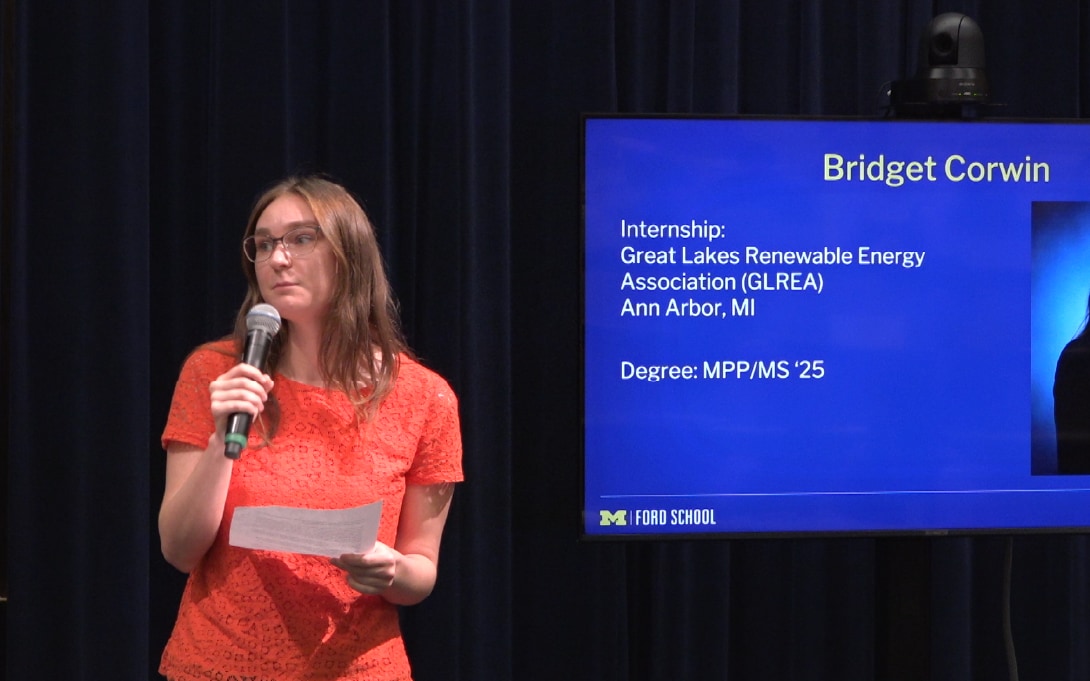
Eleven talented students showcased what they learned during their summer internship at the Ford School 7th Annual Policy Pitch Competition. Undergraduate and graduate students spent three minutes sharing their key deliverables, policy impacts, and lessons learned with the chance to compete for 1st, 2nd, and 3rd student prizes.
The panel of judges awarded students based on the clarity and effectiveness of the presentation, the potential policy impact of their work, and how it influenced the student’s long-term goals. Judges included: Yousef Rabhi, Washtenaw County Commissioner, Rohan Dharan (BA’13), Manager of Secondary Advanced and Enriched Instruction at District of Columbia Public Schools, and Latesha Love-Grayer (MPP’02), Director of International Affairs and Trade at US Government Accountability Office.
Bridget Corwin (MPP/MS ‘25) – Great Lakes Renewable Energy Association
Hi, everyone! As the first speaker, I feel the pressure to set the tone for the night and bring lots of energy, which is actually perfect, because I wanted to talk to you tonight about my favorite form of energy: electricity. Electricity touches so many parts of our lives, and I feel like we don't even pay attention to it most of the time. It makes your coffee in the morning and charges your phone. It cools your home and maybe even drives your car, or maybe partially drives your car.
Electricity is very important, and our demand for it, as our population increases, also continues to increase. But as important as it is, it also comes with some big challenges. Burning coal and natural gas for electricity produces 58 and a half million metric tons of carbon dioxide every year in Michigan alone. Additionally, over 20% of Michigan residents struggle to pay their monthly electricity bills.
If you’ve lived in Michigan for any portion of time, then you also know that we experience some of the most frequent and longest power outages in the nation. One way to address these issues is by building more renewable energy resources, like solar panels and wind turbines, which can improve the sustainability, affordability and reliability of our electricity. As a lifelong Michigander myself, I want to contribute to a better energy future for our state.
This summer I interned with the Great Lakes Renewable Energy Association – or GLREA – a nonprofit that educates homeowners and businesses about their renewable energy options, as well as supports policies that support the expansion of renewable energy in Michigan. On the education side of things, I was tasked with creating briefs about how policies like the Inflation Reduction Act and Michigan’s recent Clean Energy and Climate Action package support renewable energy and benefit everyday Michiganders. On the Advocacy side, I worked with GLREA to help keep electric utilities accountable to their customers.
This summer, DTE, the electric utility that serves Ann Arbor and many other parts of the state, proposed decreasing the renewable energy and efficiency programs while increasing electricity rates for their customers before the Michigan Public Service Commission. In response, I was tasked with researching how other electric utilities’ sustainability initiatives compare with DTE’s. Ultimately we found and testified before the Commission that not only could DTE feasibly implement a variety of new and innovative sustainability programs that would reduce costs and improve reliability, but that they were also compelled to do so by the policies laid out in Michigan’s Clean Energy and Climate Action package.
This experience really reaffirmed my interest in energy policy and the positive social and environmental impacts it can have on Michigan communities. Taking on the different roles of communicator and advocate was also a great reminder that policy doesn't just stop at policy creation. There are so many other parts of the process that are important, like advocacy, communication, implementation, and assessment.
I'm looking forward to continuing to learn about each of these roles to more effectively advance a more sustainable, equitable, reliable, and clean energy future in Michigan. Thank you.
Read the other pitches:
Georgina Bailey – Lansing Board of Water & Light
Bridget Corwin – Great Lakes Renewable Energy Association
Audrey Dombro – City of Philadelphia, Office of Transportation and Infrastructure Systems
Nia Knox – UM Poverty Solutions
Emily Kuttner – City of Chicago, Mayor's Office
Alexie Milukhin – The Institute for College Access and Success (TICAS)
Samuel Owusu – U.S. House of Representatives, Committee on Education & the Workforce
Aiswarya Padmanabhan – Trust for Social Achievement
Katrina Wheelan – City of Detroit, Office of Budget
